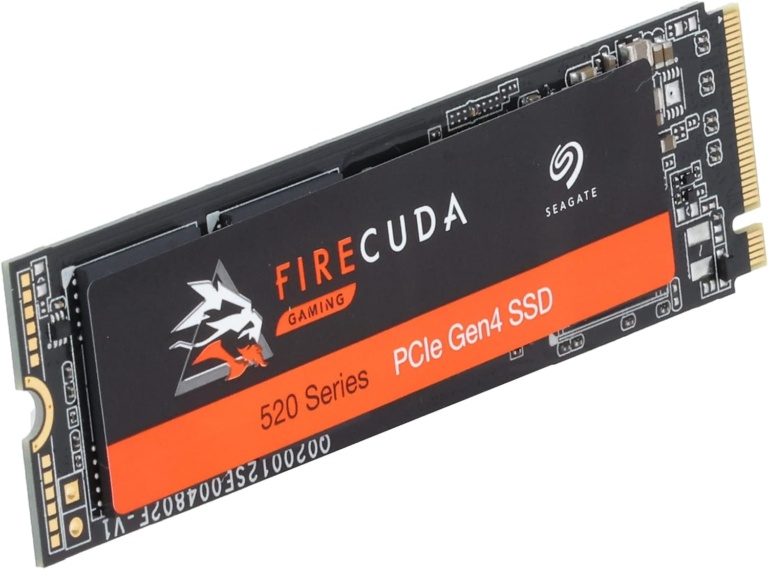Let’s get straight to the point – how can you add more storage to your laptop for gaming?
You have several options to expand your laptop’s gaming storage depending on your device’s configuration. For example, you can replace your current hard drive with one that has more capacity if your laptop allows only a single storage drive. Adding a secondary hard drive is an excellent (and recommended) option for those with an extra available drive bay. Using an external disk is always better in terms of convenience. Additionally, you can leverage cloud storage services to store and access game data remotely.
Upgrading your laptop’s original storage drive, HDD or SSD, is like getting a bigger backpack – more space for all those gaming goodies, improving how your laptop runs games. Meanwhile, a secondary hard drive keeps your primary storage intact while allowing you to run games from a separate disk, mitigating system crashes due to file corruption or software conflicts.
Using an external drive for laptop gaming brings the added benefit of portability and easier expansion; however, it restricts you in terms of performance. External drives are not meant to operate at the same speeds as internal storage drives. Cloud drives offer the same challenge.
- Replacing and Upgrading the Existing Storage Drive on Your Laptop
- Adding a Secondary Storage Drive to Your Laptop
- Using an External Laptop Storage Drive for Gaming
- Signing Up for Cloud Storage
- Can You Use an SD Card to Upgrade Your Laptop Storage for Gaming?
- How Much GB of Storage is Good for a Gaming Laptop?
- Laptop Storage Upgrade Options – A Comparison
- SSD or HDD for Laptops – Which is Better for Gaming?
- Best Solid-State Drives (SSDs) for Laptop for Gaming
Replacing and Upgrading the Existing Storage Drive on Your Laptop
If your laptop only has a single drive bay, replacing and upgrading your existing storage drive is the best solution to adding more space to your laptop for gaming. But be aware; you’d essentially be replacing the system disk on your laptop. So, it’s important to backup the important data and files before proceeding.
Let’s talk about your storage drive options. Solid State Drives (SSDs) and Hard Disk Drives (HDDs) are the two main contenders here. SSDs are the speed champs, reliable with flash memory for lightning-fast boot-ups and snappy apps. HDDs offer more room at a lower cost but are slower.
Laptops with a single bay typically rock a 2.5-inch SATA slot. Therefore, whatever storage drive you choose in the end, SSD or HDD, make sure it runs on the SATA bus interface and can fit inside your laptop’s 2.5-inch bay.
The upgrading steps might differ slightly based on your laptop. If tech stuff isn’t your jam, we recommend getting a pro to lend a hand. With the rollout of Windows 11, a spacious primary drive can seriously supercharge your gaming and overall laptop experience.
Does Upgrading Your Laptop’s Storage Void Its Warranty?
Upgrading your laptop’s storage doesn’t result in the forfeiture of the warranty, at least in the United States. The Federal Trade Commission (FTC) strictly warns laptop manufacturers from issuing any warranty provisions that go against this policy.
Adding a Secondary Storage Drive to Your Laptop
If you have a more modern laptop with an extra drive bay, adding a secondary internal storage for gaming makes the most sense.
Once again, you’ll start with identifying the type of storage slot available on your laptop. Most secondary laptop drive bays come with an M.2 SSD bay. However, some older machines may feature an mSATA solid-state drive slot. There are no secondary bays for HDDs on laptops.
If you have an M.2 SSD expansion slot, you can choose from a variety of solid-state drives depending on your M.2 protocol support type. Some M.2 SSD bays support the SATA protocol only, others work with NVMe SSDs, and some others support both SATA and NVMe protocol-based SSDs. The latter protocol is the speedster choice, processing your game data at lightning-fast speeds. Naturally, SSDs with NVMe cost more than SATA SSDs.
Other important things to consider are the length and the key configurations of your M.2 SSD slot.
- M2 SSDs come in different lengths, ranging from 42mm to 80mm
- Meanwhile, you get two key configurations: B keys and M keys. B keys mean you can go with either SATA or PCIe bus interface. In contrast, M keys provide compatibility with the high-speed PCIe bus interface.
mSATA SSDs have although become obsolete, their replacements are still available. They offer similar performance to the traditional 2.5-inch SATA SSDs.
Remember, laptop styles can vary – not all laptops are created equal. If you are unsure about your laptop configurations, you can always refer to the product manual for help. Alternatively, you can use a free online laptop specs checker.
Does the Laptop Brand Affect the Type of Storage Device?
In most cases a laptop’s brand doesn’t affect the type of storage device you can install. Most companies these days manufacture laptops with different configurations that support all modern and (even) legacy technologies in some cases.
For example, HP offers a variety of gaming laptops under its OMEN brand. These laptops have M.2 slots that work with both SATA and NVMe SSDs. Likewise, some of its other laptops support HDDs. The same is true for ASUS, Razer, Acer and other popular laptop brands.
However, the laptop model can affect the type of storage device. Therefore, it’s recommended to check your laptop’s specs before buying a replacement or secondary internal storage drive.
Using an External Laptop Storage Drive for Gaming
This option works well if you’re stuck with a laptop sporting a soldered-down SSD, leaving little to no room for internal upgrades. Some people might use an external storage drive for easier expansion regardless of their laptop’s specs.
While using an external storage drive has its benefits in the form of portability, convenience, and improved accessibility, it doesn’t provide the best speed for gaming on your laptop. This is a critical trade-off. Gaming is all about high processing speeds and if your storage drive fails to meet this important requirement, you are using the wrong hardware.
Also, some external storage devices like USB flash drives lack the space to store modern triple A games. That’s another issue with using these drives for gaming.
Still, if you’re insistent about using an external storage for your gaming laptop, our advice would be to use it as a support drive for storing media and office files. This will free up space on your primary drive, which you can then use for gaming.
Looking for an external storage option that lets you access your important files across the different systems on your network? A Network Attached Storage (NAS) is best for this type of application.
Signing Up for Cloud Storage
Finally, you can use a cloud storage service to boost storage space on your laptop for gaming. Like external storage devices, cloud storage services work best as supporting drives, lacking in processing speed. You can use them in tandem with your local storage and save non-system and non-gaming files on them.
Some popular cloud storage options include:
- Google Drive, with 15GB free storage and affordable plans for more space
- iCloud offers 5GB space for Apple users for free
- Dropbox comes with a free 2GB plan and multiple upgrade options
- Microsoft’s OneDrive allows you to store up to 5GB of files for free and ties in well with Windows’ systems
Can You Use an SD Card to Upgrade Your Laptop Storage for Gaming?
You can expand your laptop storage for gaming using an SD card, but it’s not ideal for high-performance gaming. Games require fast data access, and SD cards may introduce significant lag and load times due to their limited data transfer rates. They are best used for expanding your laptop’s data storage and not actual gaming installations. Consider an SSD or HDD for the latter.
How Much GB of Storage is Good for a Gaming Laptop?
For a gaming laptop, shooting for 1TB (or 1000GB) of storage is ideal for most users. It allows enough space for handling multiple AAA game titles and a high-end OS installation, like Windows 11. You can keep 20-30% of storage free for optimal drive performance and still keep loading up on media and important work files. To make your purchase future-proof, we’d recommend 2TB (2000GB).
The types of games you play influence your laptop storage upgrade decision in a big way. Here are some popular AAA and multiplayer games and their storage requirements:
Popular AAA Games:
| Games | Storage Requirement |
| Red Dead Redemption 2 | 150 GB |
| The Last of Us – Part 2 | 100 GB |
| Starfield | 125 GB |
| Mass Effect – Legendary Edition | 120 GB |
| The Witcher 3: Wild Hunt | 50 GB |
Online Multiplayer Games:
| Games | Storage Requirement |
| Call of Duty: Warzone | 125 GB |
| Fortnite | 30-40 GB |
| Apex Legends | 56 GB |
| (PUBG) : Battlegrounds | 50 GB |
| Destiny 2 | 105 GB |
Laptop Storage Upgrade Options – A Comparison
| Laptop Storage Upgrade Option | Best for | Recommended Use Case | Expected Cost |
| Replacing Current Drive | Systems with Single Drive Bays | Primary Game Drive | $40-$100 |
| Adding a Secondary Drive | Systems with Extra Drive Bays | Primary Game Drive | $60-$100 |
| Using External Drive | Systems with Soldered-Down SSDs | As a Supporting Storage | $70-$200 |
| Signing Up for Cloud | Systems with Soldered-Down SSDs | As a Supporting Storage | Depends on the pricing plan |
| Installing an SD Card | Systems with Soldered-Down SSDs | As a Supporting Storage | $15-$60 |
SSD or HDD for Laptops – Which is Better for Gaming?
Solid State Drives (SSDs) are better for gaming as storage solutions. The key reason lies in their speed. SSDs deliver faster data access times than Hard Disk Drives (HDDs). They utilize NAND flash memory for data storage, allowing them to swiftly access and load game files. This speed advantage significantly reduces load times and in-game lags.
Additionally, unlike HDDs, SSDs have no mechanical components like spinning disks or read/write heads, making them less prone to physical damage from bumps or drops.This shouldn’t be confused with longevity in terms of total write cycles, where HDDs have a significant advantage.
Lastly, SSDs are silent in their operations, which is crucial for an immersive gaming experience. The spinning disks inside HDDs produce a whirring sound that some gamers do not appreciate.
Best Solid-State Drives (SSDs) for Laptop for Gaming
Looking for top laptop SSD recommendations?
- Seagate BarraCuda: This beast is your ticket to maxed-out gaming, rocking PCIe Gen4 X4 and NVMe 1.3. Whether on a gaming laptop, desktop, or PC, it’s your turbocharged storage solution.
- SAMSUNG 980 SSD: This storage dynamo offers 1TB capacity, PCIe 3.0×4, and NVMe M.2 2280 brilliance. It’s your ultimate gaming PC and laptop, flaunting speeds soaring up to 3,500MB/s.
- Crucial P5 Plus: A gaming gem with a 1TB PCIe Gen4 NVMe M.2 SSD. Get ready for mind-blowing speeds up to 6600MB/s. It’s your ticket to storage supremacy!
| Image | Product | Features | Price |
|---|---|---|---|
 |
| Check Price | |
 |
| Check Price | |
 |
| Check Price |
Please make sure these drives are compatible with your laptop before you go and order them online.
So juice up your laptop’s storage and get ready for lifelong, exciting gaming adventures!

